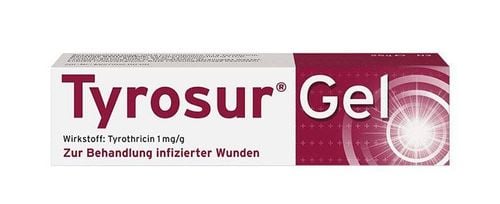This is an automatically translated article.
Tusstadt is a prescription medicine used in the treatment of certain allergic conditions. So what is Tusstadt and how does it work?
1. What does Tusstadt do?
Tusstadt is produced in the form of a syrup with a reddish brown color, homogeneous, with a sweet, slightly spicy, fruity aroma. The main ingredient of the drug Tusstadt is Diphenhydramine hydrochloride with the content of 150mg of the active ingredient in 60ml of the drug or 250ml of the active ingredient in 100ml of the drug. Diphenhydramine is an ethanolamine-type antihistamine that competes for the H1-histamine receptor. Diphenhydramine has significant sedative and anticholinergic effects. However, the effects of this active ingredient vary widely from person to person, depending on which type of effect predominates.
For people with brain damage, the elderly and people with dementia are very sensitive to potentially harmful anticholinergic effects in the central nervous system. As with people with dementia and people with brain damage, there is an increased risk that Tusstadt may cause confusion.
Tusstadt is indicated in the following cases:
Relief of allergic symptoms caused by histamine release such as nasal allergies and atopic skin diseases. Can be used as a mild sedative at night. Motion sickness prevention and cough treatment. Anti-nausea. Treatment of dystonic reactions caused by phenothiazines. Tusstadt is contraindicated in the following cases:
People who are sensitive to Diphenhydramine or other antihistamines with a chemical structure similar to Asthma Infants, premature babies. Chronic Pneumonia Angle-closure Glaucoma. Urinary retention due to prostatic urethral disorders. Women are breastfeeding. Tusstadt should be used with caution in the following cases:
The sedative effect of Tusstadt may be greatly enhanced when used concurrently with alcohol, or with central nervous system depressants. Special caution must be exercised and it is better not to use Tusstadt for the following subjects: Enlarged prostate gland; Bladder obstruction; pyloric stenosis ; People with myasthenia gravis; Narrow angle glaucoma.
2. Dosage and how to use Tusstadt
The drug Tusstadt is taken orally. Tusstadt can be taken with food, water or milk to reduce stomach irritation. When taking Tusstadt to prevent motion sickness, you need to take it at least 30 minutes and preferably 1-2 hours before boarding the train.
The dose of this drug should be according to the doctor's prescription, the reference dose for specific cases is as follows: Tusstadt dose is usually used for adults and adolescents:
Antihistamine: Use a dose of 25 - 50mg/ lane, once every 4-6 hours. Antikinetic in the treatment of Parkinson's disease and Parkinson's syndrome after encephalitis: Use a dose of 25mg / time x 3 times / day at the beginning of treatment, then the dose can be gradually increased up to 50 mg / time x 4 times /day. Anti-vomiting or anti-vertigo: Use a dose of 25-50mg/time, every 4-6 hours. Sedation, sedation: Use dose 50mg/time, take 20-30 minutes before going to bed. Cough treatment: Use a dose of 25mg/time, every 4~6 hours. The maximum dose for adults is 300 mg per day. The usual dose of Tusstadt for children is as follows:
Antihistamines: Children under 6 years old: Use a dose of 6.25 - 12.5 mg/time, every 4-6 hours. Children 6 - 12 years old: Use a dose of 12.5 - 25mg / time, every 4-6 hours. The maximum Tusstadt dose for children for antihistamines is 150mg per day. Anti-vomiting or anti-vertigo: Use a dose of 1 - 1.5 mg/kg body weight, every 4-6 hours, the total dose should not exceed 300mg per day.
3. Tusstadt side effects
During the use of Tusstadt, you may experience some side effects of the drug, including: Dozing off; Dry mouth ; Visual disturbance.
If you see unusual symptoms after taking Tusstadt, tell your doctor or go to the nearest medical facility for timely support.
4. Tusstadt drug interactions with other drugs
Using Tusstadt together with CNS depressants will increase the CNS depressant effect. Co-administration of Tusstadt with monoamine oxidase inhibitors (MAOIs) prolongs and enhances the anticholinergic effects of diphenhydramine. Therefore, the use of Tusstadt is contraindicated in patients taking MAOIs.
Please dial HOTLINE for more information or register for an appointment HERE. Download MyVinmec app to make appointments faster and to manage your bookings easily.













